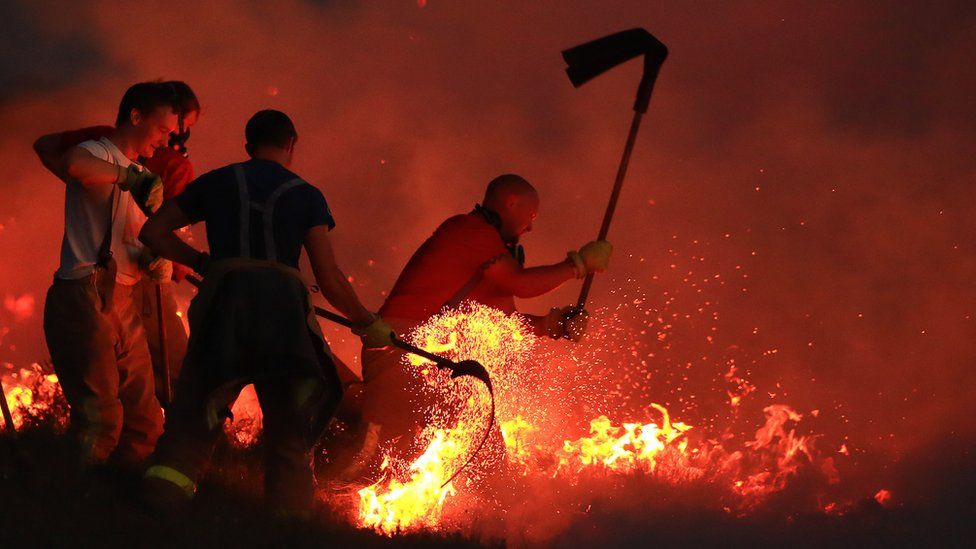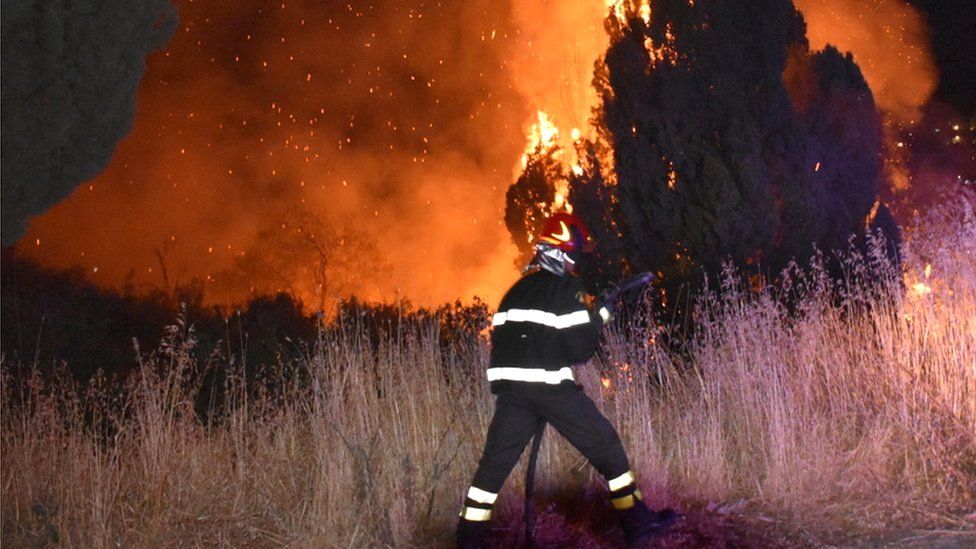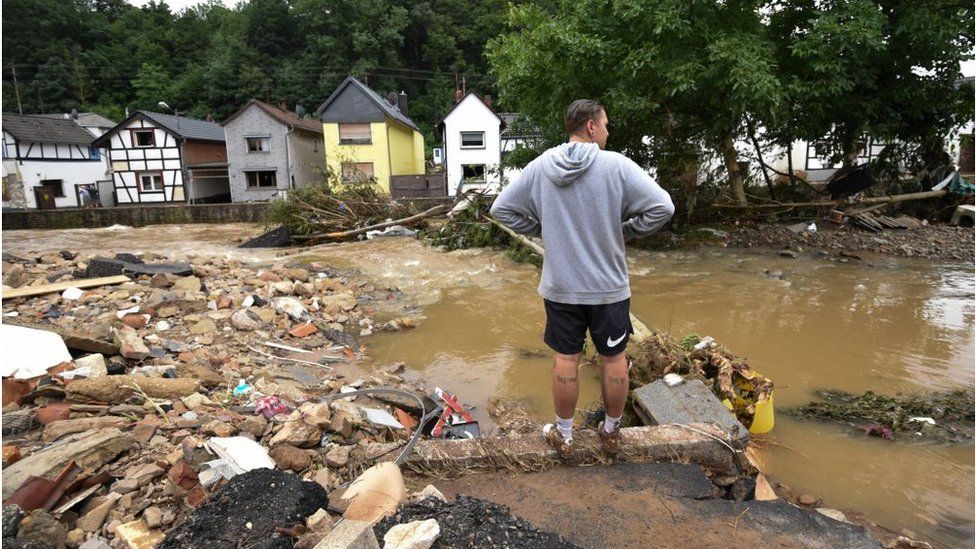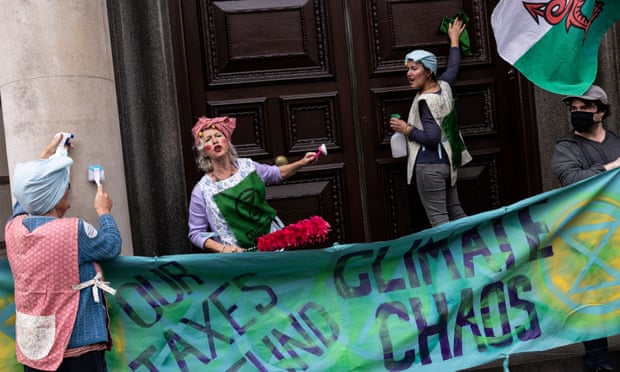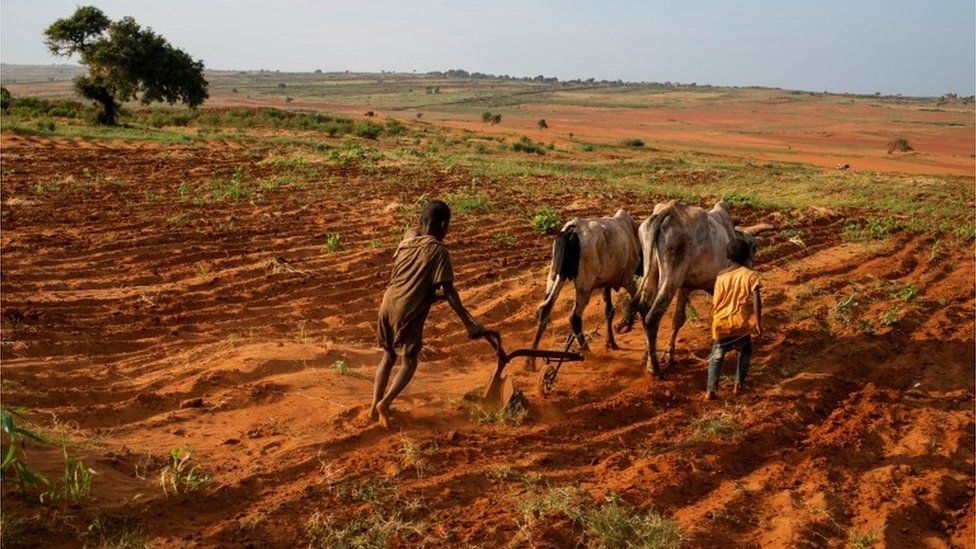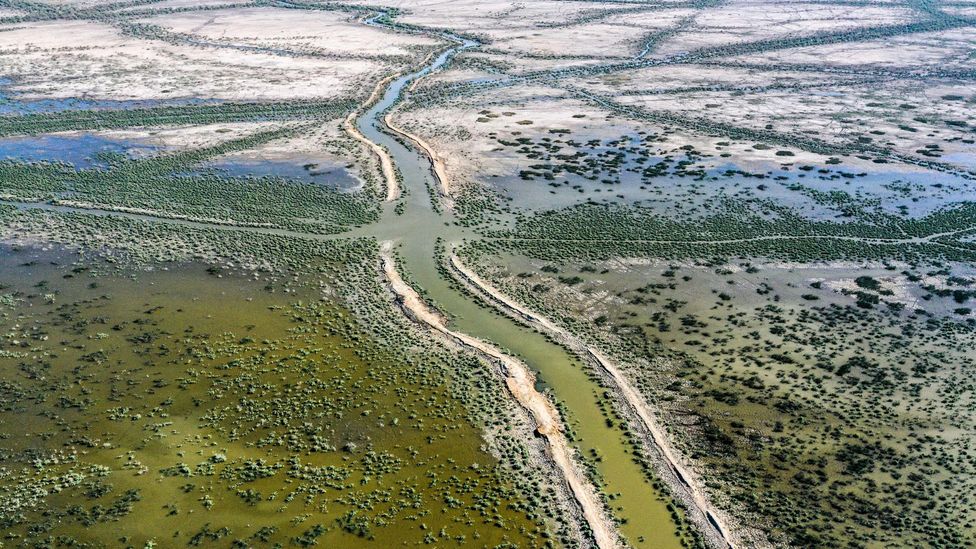 How water shortages are brewing warsUnprecedented levels of dam building and water extraction by nations on great rivers are leaving countries further downstream increasingly thirsty, increasing the risk of conflicts
How water shortages are brewing warsUnprecedented levels of dam building and water extraction by nations on great rivers are leaving countries further downstream increasingly thirsty, increasing the risk of conflictsSpeaking to me via Zoom from his flat in Amsterdam, Ali al-Sadr pauses to take a sip from a clear glass of water. The irony dawning on him, he lets out a laugh. "Before I left Iraq, I struggled every day to find clean drinking water." Three years earlier, al-Sadr had joined protests in the streets of his native Basra, demanding the authorities address the city's growing water crisis.
"Before the war, Basra was a beautiful place," adds the 29-year-old. "They used to call us the Venice of the East." Bordered on one side by the Shatt al-Arab River, the city is skewered by a network of freshwater canals. al-Sadr, a dockhand, once loved working alongside them. "But by the time I left, they were pumping raw sewage into the waterways. We couldn't wash, the smell [of the river] gave me migraines and, when I finally fell sick, I spent four days in bed." In the summer of 2018, tainted water sent 120,000 Basrans to the city's hospitals – and, when police opened fire on those who protested, al Sadr was lucky to escape with his life. "Within a month I packed my bags and left for Europe," he says.
Around the world, stories like al Sadr's are becoming far too common. As much as a quarter of the world's population now faces severe water scarcity at least one month out of the year and – as in al-Sadr's case – it is leading many to seek a more secure life in other countries. "If there is no water, people will start to move," says Kitty van der Heijden, chief of international cooperation at the Netherlands' foreign ministry and an expert in hydropolitics. Water scarcity affects roughly 40% of the world's population and, according to predictions by the United Nations and the World Bank, drought could put up to 700 million people at risk of displacement by 2030. People like van der Heijden are concerned about what that could lead to.
"If there is no water, politicians are going to try and get their hands on it and they might start to fight over it," she says.
Over the course of the 20th Century, global water use grew at more than twice the rate of population increase. Today, this dissonance is leading many cities – from Rome to Cape Town, Chennai to Lima – to ration water. Water crises have been ranked in the top five of the World Economic Forum's Global Risks by Impact list nearly every year since 2012. In 2017, severe droughts contributed to the worst humanitarian crisis since World War Two, when 20 million people across Africa and the Middle East were forced to leave their homes due to the accompanying food shortages and conflicts that erupted.
Peter Gleick, head of the Oakland-based Pacific Institute, has spent the last three decades studying the link between water scarcity, conflict and migration and believes that water conflict is on the rise. "With very rare exceptions, no one dies of literal thirst," he says. "But more and more people are dying from contaminated water or conflicts over access to water."
Falling water quality around Basra, southern Iraq, has been exacerbated by reduced river flows due to damming in TurkeyGleick and his team are behind the Water Conflict Chronology: a log of 925 water conflicts, large and small, stretching back to the days of the Babylonian king Hammurabi. It is not, by any means, exhaustive and the conflicts listed vary from full blown wars to disputes between neighbours. But what they reveal is that the relationship between water and conflict is a complex one.
"We categorised water conflicts in three groups," says Gleick. "As a 'trigger' of conflict, where violence is associated with disputes over access and control of water; as a 'weapon' of conflict, where water or water systems are used as weapons in conflicts, including for the use of dams to withhold water or flood downstream communities; and as 'casualties' or 'targets' of conflicts, where water resources or treatment plants or pipelines are targeted during conflicts."
Leaf through the records he and his colleagues have compiled, however, and it becomes clear that the bulk of the conflicts are agriculture-related. It's perhaps not surprising as agriculture accounts for 70% of freshwater use. In the semi-arid Sahel region of Africa, for example, there are regular reports of herdsmen and crop farmers clashing violently over scarce supplies of water needed for their animals and crops.
But as demand for water grows, so too does the scale of the potential conflicts.
"The latest research on the subject does indeed show water-related violence increasing over time," says Charles Iceland, global director for water at the World Resources Institute. "Population growth and economic development are driving increasing water demand worldwide. Meanwhile, climate change is decreasing water supply and/or making rainfall increasingly erratic in many places."
Nowhere is the dual effect of water stress and climate change more evident than the wider Tigris-Euphrates Basin – comprising Turkey, Syria, Iraq and western Iran. According to satellite imagery, the region is losing groundwater faster than almost anywhere else in the world. And as some countries make desperate attempts to secure their water supplies, their actions are affecting their neighbours.
During June 2019, as Iraqi cities sweltered through a 50C (122F) heatwave, Turkey said it would begin filling its Ilisu dam at the origins of the Tigris. It is the latest in a long-running project by Turkey to build 22 dams and power plants along the Tigris and the Euphrates that, according to a report by the French International Office for Water, is significantly affecting the flow of water into Syria, Iraq and Iran. It claims that when complete Turkey's Guneydogu Anadolu Projesi (GAP) could include as many as 90 dams and 60 power plants. (See how dams such as the Ilisu are reshaping our planet.)
As water levels behind the mile-wide Ilisu dam rose, the flow from the river into Iraq halved. Thousands of kilometres away in Basra, al-Sadr and his neighbours saw the quality of their water deteriorate. In August, hundreds of people began pouring into Basra's hospitals suffering from rashes, abdominal pain, vomiting, diarrhoea, and even cholera, according to Human Rights Watch.
"There's actually two parts to the story in Basra," Iceland says. "Firstly, you have the obvious discharge of wastewater into local waterways without any treatment. But you've also got to consider the damming at the Turkish border – with less freshwater flowing down the Tigris and Euphrates, saltwater is intruding further up the river (from the Persian Gulf). Over time, it's ruining crops and it's making people sick."
It's a complicated picture, but this ability to see links between the seemingly disparate has informed Iceland's work with the Dutch government-funded Water, Peace and Security (WPS) partnership, a group of six American and European NGOs (including the Pacific Institute and the World Resources Institute). They've developed a Global Early Warning Tool, which uses machine learning to predict conflicts before they happen.
It combines data about rainfall, crop failures, population density, wealth, agricultural production, levels of corruption, droughts, and flooding, among many other sources of data to produce conflict warnings. They are displayed on a red-and-orange Mercator projection down to the level of administrative districts. Currently it is warning of around 2,000 potential conflict hotspots, with an accuracy rate of 86%.
The Indus River is a vital water source for northern India and Pakistan, but originates in the mountains of Tibet that are controlled by China.
But while the WPS Tool can be used to identify locations where conflicts over water are at risk of breaking out, it can also help to inform those hoping to understand what is happening in areas that are already experiencing strife due to water scarcity.
India's Northern Plains, for example, are one of the most fertile farming areas in the world, yet today, villagers regularly clash over water scarcity. The underlying data reveals that population growth and high levels of irrigation have outstripped available groundwater supplies.
Despite the area's lush-looking cropland, the WPS map ranks nearly every district in Northern India as "extremely high" in terms of baseline water stress. Several key rivers which feed the area – the Indus, Ganges and Sutlej – all originate on the Tibetan side of the border yet are vital for water supplies in both India and Pakistan. compounds the problem. Several border skirmishes have broken out recently between India and China, which lays claim to upstream areas.
A violent clash in May last year in the Galwan Valley, through which a tributary to the Indus flows, left 20 Indian soldiers dead. Less than a month later there were reports that China was building "structures" that might dam the river and so restrict its flow into India.
But the data captured by the Global Early Warning tool also reveals some strange trends. In some of the most water-stressed parts of the world, there appears to be a net-migration of people into these areas. Oman, for example, suffers higher levels of drought than Iraq but received hundreds of thousands of migrants per year prior to the pandemic. That's because Oman fares far better than the latter in terms of corruption, water infrastructure, ethnic fractionalisation, and hydropolitical tension.
"A community's vulnerability to drought is more important than the drought itself," says Lina Eklund, of a physical geography researcher at Sweden's Lund University.
Water shortages are not simply about drought but also about decreasing water quality due to pollution.
The link between water scarcity and conflict, in other words, isn't as straightforward as it seems. Even where severe drought exists, a complex mix of factors will determine whether it actually leads to conflict: social cohesion being one of the most important.
Take the Kurdistan region of Iraq, for example: an area which suffered through the same five-year drought that pushed one-and-a-half million Syrian farmers into urban centres in March 2011. The tight-knit Kurdish community didn't experience the same exodus, discontent, or subsequent infighting. Jessica Hartog, head of natural resource management and climate change at International Alert, a London-based NGO, explains this is because the Syrian government, aiming for food self-sufficiency, had long subsidised agriculture, including fuel, fertiliser, and ground water extraction. When Damascus abruptly scrapped these supports mid-drought, rural families were forced to migrate en masse to urban centres bringing a distrust of the al-Assad regime with them, fueling the bitter civil war that has torn the country to pieces.
But if potential flash-points for conflicts over water can be identified, can something be done to stop them in the future?
Unfortunately, there's no one-size-fits-all solution to water scarcity. In many countries simply reducing loss and leaks could make a huge difference – Iraq loses as much as two-thirds of treated water due to damaged infrastructure. The WPS partners also suggest tackling corruption and reducing agricultural over-abstraction as other key policies that could help. Iceland even suggests increasing the price of water to reflect the cost of its provision – in many parts of the world, humans have grown used to getting water being a cheap and plentiful resource rather than something to be treasured.
Much can also be done by freeing up more water for use through techniques such as desalination of seawater. Saudi Arabia currently meets 50% of its water needs through the process. "Grey", or waste water, recycling can also offer a low-cost, easy-to-implement alternative, which can help farming communities impacted by drought. One assessment of global desalination and wastewater treatment predicted that increased capacity of these could reduce the proportion of the global population under severe water scarcity from 40% to 14%.
At the international level, extensive damming by countries upstream are likely to increase the risk of disputes with those that rely on rivers for much of their water supply further downstream. But Susanne Schmeier, associate professor of water law and diplomacy at IHE Delft in the Netherlands, says that co-riparian conflict is easier to spot and less likely to come to a head. "Local conflicts are much more difficult to control and tend to escalate rapidly – a main difference from the transboundary level, where relations between states often limit the escalation of water-related conflicts," she says
Around the world, there's plenty of examples where tensions are high though – the Aral Sea conflict comprising Kazakhstan, Uzbekistan, Turkmenistan, Tajikistan and Kyrgyzstan; the Jordan River conflict amongst the Levantine states; the Mekong River dispute between China and its neighbours in Southeast Asia. None have yet boiled over into conflict. But Schmeier also points towards one dispute that is showing signs it might.
Egypt, Sudan, and Ethiopia all depend on inflow from the Blue Nile and have long exchanged political blows over the upstream Great Ethiopian Renaissance Dam (GERD) project – a dam built at $5bn (£3.6bn), and three times the size of the country's Lake Tana.
When the Ethiopian government announced plans to press ahead regardless, Egypt and Sudan held a joint war exercise in May this year, pointedly called "Guardians of the Nile." It has perhaps the highest risk of spilling into a water war of all the disputes in today's political landscape, but there are several other hotspots around the world. Pakistani officials, for example, have previously referred to India's upstream usage strategy as "fifth-generation warfare", whilst Uzbek President Islam Karimov has warned that regional disputes over water could lead to war.
"I won't name specific countries, but all of this could deteriorate to the point where not just serious confrontation, but even wars could be the result," he said.
Ethiopia's Grand Renaissance Dam on the Blue Nile has led to rising tensions with Egypt and Sudan who rely on the river downstream (Credit: Eduardo Soteras/AFP/Getty Images)
Ethiopia's Grand Renaissance Dam on the Blue Nile has led to rising tensions with Egypt and Sudan who rely on the river downstream (Credit: Eduardo Soteras/AFP/Getty Images)
Water-sharing agreements are a common way of de-escalating these kinds of dispute. More than 200 have been signed since the end of the Second World War – such as the 1960 Indus Waters Treaty between India and Pakistan, and an agreement between Israel and Jordan signed before their peace treaty. But a more than decade-long attempt by the UN to introduce a global Water Convention on transboundary rivers and lakes has only resulted in 43 countries agreeing to be bound by it.
Hartog says modern treaties will likely need to include a drought mitigation protocol, to assuage downstream countries' fears of being cut-off in a crisis and a dispute resolution mechanism, for when things turn ugly.
In fact, that would mirror the example set by Lesotho, South Africa, Botswana and Namibia who, after tensions bubbled to dangerous levels over shared resources in 2000, intensified cooperation via the Orange-Senqu River Commission (Orasecom). In that example, the establishment of shared watercourse agreements and enshrining the principles of reasonable use proved enough to de-escalate the situation. Where it becomes necessary to free up additional water, though, the research consistently suggests that desalination and wastewater treatment are two of the most efficient strategies.
Perhaps Egypt is heeding this message. The country's government last year brokered a number of deals to open as many as 47 new desalination plants in the country, along with the world's largest wastewater treatment plant. Although the Egyptian authorities have accelerated construction of the plants, the bulk of these projects not due to be completed until after 2030 and the country's water situation continues to degrade. Hartog believes Egypt, Ethiopia and Sudan may need to seek outside help if they are to avoid conflict.
"It looks unlikely that the three countries will find an agreement themselves and international diplomatic efforts need to be stepped up to avoid an escalation," she says, adding that pressure is mounting on the increasingly-isolationist government in Addis Ababa. "This might well be the best entry point for countries like the US, Russia and China to join forces to help the riparian countries to secure a trilateral binding agreement."
A water sharing agreement for the Orange-Senqu river basin was signed in 2000, but dams on its tributaries remain controversial (Credit: John Wessels/AFP/Getty Images)
And what of internal conflict? Several smaller nations are blazing their own trails to better manage water. Peru requires water utility providers to reinvest a portion of their profits into research and integrating green infrastructure into stormwater management. Vietnam is cracking down on industrial pollution along its portion of the Mekong Delta, and integrating traditional-built water infrastructure to ensure a more equitable distribution amongst its urban and rural residents.
As climate change and growing human populations continue to compound the problem of droughts around the world – such solutions will become ever more necessary to stop conflict and migration. In December last year – more than two years after Ali al-Sadr left Basra – fewer than 11% of households in the city had access to clean drinking water. An injection of $6.4m (£4.6m/€5.5m) from the Netherlands, facilitated by Unicef, at the end of 2020 is now helping to upgrade the city's creaking water infrastructure, but power cuts earlier this summer shut down many of the city's water pumps amid soaring temperatures.
For those al-Sadr left in the city, the wider implications of their plight are hard to see when faced with daily problems getting clean water and the city was hit by further unrest in recent months. Until the situation gets better, al-Sadr fears the angry demonstrations will continue.
"When I protested, I didn't know what was behind it all," says Ali. "I just wanted something to drink."
Link to Article - Photos:https://www.bbc.com/future/article/2021 ... obal-en-GB